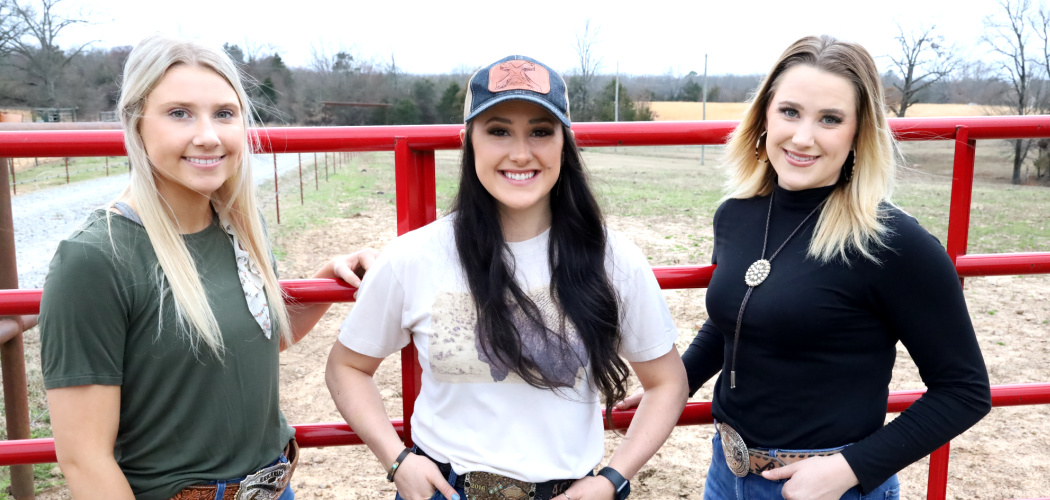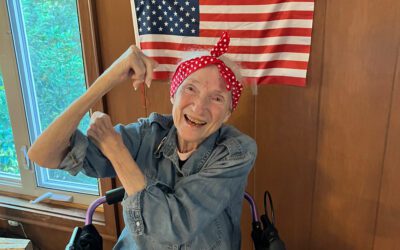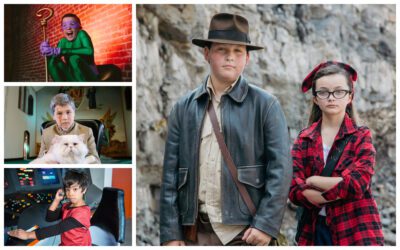[title subtitle=”WORDS and IMAGE Dwain Hebda”][/title]
In the far reaches of Faulkner County, Arkansas, the land yawns wide and flat. Around every bend in the road, the windbreaks cradle flat pastures billowing in the breeze. Here and there a house or barn dots the hillside, but mostly all you see are ranch gates and dirt roads.
On a spread just outside of Mt. Vernon near the county line sits the Raby place, home to one of the most prolific rodeo families in the state if not the nation. The Rabys have been tied up in rodeo for four generations, and they’re not done yet with the current crop of the family’s competitors arguably the greatest in the family line.
There’s not a cowpoke in the bunch save for Robbie Raby, the father of this brood and a former bull rider. But he’s well outnumbered by the latest generation, three straight-talking and competitive sisters who don’t back down from anyone in the arena, especially each other.
“It’s been pretty intense from time to time,” said Gracie, nineteen, and a sophomore at Henderson State University on a basketball scholarship. “It’s like, we all want each other to do well, just not better than yourself, you know?”
If you didn’t know coming in, there’s no mistaking which of the three Raby girls is the oldest. As successful as her younger sisters Kenlie, eighteen, and Marlee, fifteen, have been, there’s an aura about Gracie that tells you she’s set the bar for the other two to reach. When she was younger, she’d routinely take on the boys in rodeo events and always left them knowing who they were up against, so you can imagine how hard she drove herself against other girls, kin or not.
“The first time I competed, when I was in with the big girls – and when I say big girls, I mean they were eight, nine – I was maybe six. By the time I was eight, the competitiveness had kicked in, and I was like, ‘I want to win,’” Gracie said. “Rodeo is a lot of hard work, and I can’t even tell you how many hours of practice it takes to get really good at it. As much as I love it, it’s very hard work.”
Gracie’s grit paid off with world rankings in junior high and high school. Over her career, she’s done every rodeo event possible, but she built her reputation on breakaway roping and goat tying, pushed from behind by Kenlie.
“Well, we’re only sixteen months apart, so Gracie and I have always been close. But the competitiveness — I’ll say this,” Kenlie says. “I’ve always been runner-up to her. I was always mad and upset about it and stuff, but it did push me to want to be better. You want to be practicing with the best and be able to ride behind her. I appreciate it now that I’m older because I know what it takes to be good.”
One look at Kenlie’s competitive achievements tells you she learned the hard lessons well. In 2017 she was a reserve world champion junior high breakaway roper and last year placed fifth at the National High School Finals Rodeo. Next year, she’ll compete at the college level, having accepted a rodeo scholarship to Missouri Valley College in Marshall.
“In a team sport, if you’re having a bad day, people can help pick you up. That’s not how it is in rodeo,” she says. “It’s what your capability is in the arena, and that’s it. So, if you’re having a bad day, guess what? That sucks. It does. But it’s a reflection of your own practice and time that you put into it.”
Where Gracie and Kenlie exude a palpable determination and intensity, Marlee comes off like the family Zen master. With a few more years between her and her sisters, she’s been less of a competitive threat and more the student, soaking up the lessons of her siblings.
“Growing up, I knew there was a lot to look up to,” she says. “Gracie has always been a super-big role model for me, and I always looked up to Kenlie, too. Gracie set the standard super-high for Kenlie, and seeing what Kenlie had to do to reach her goals to get up there with Gracie, that helped me.”
As a freshman, this is the first year Marlee has directly competed against one of her sisters on the school team, something she admits adds pressure for the first time in her rodeo career, knowing the expectations laid out for her.
“At times, it did get tough,” she says. “It makes you want to quit a little bit, just because of feeling like I’m not going to be good enough as my sisters. My parents have always been super supportive, and they’ve shown me what it takes to reach those goals and that it’s going to take hard work to get what you want.
“If you want something, in order to get it you have to work hard in practice. Kinlie always told me, ‘Don’t be upset if you haven’t done what it takes to win. If you’re not going to work hard for it, you shouldn’t expect to win.’”
The girls’ parents – Robbie and Jennifer – stoked that work ethic with inviolate conditions for the girls’ rodeo participation. Both have the sport in their blood, Robbie from his competitive days and Jennifer from her family’s long history of managing the sport locally. Her grandparents, Roy and Kris Lee started the Flying L Rodeo in 1959 here in Mt. Vernon. They’d eventually pass it down to their kids – Jim Lee, Joyce Lee, and Jennifer’s mother, Barbara Warren – who operate it to this day.
Given her pedigree, it’s the height of irony that Jennifer is the only household member to have never competed in the sport. Growing up, she gravitated toward basketball which led her to college on a scholarship, a sporting legacy she passed on to all three girls. But after college, she came home and traded buckets for the broncs of the family business as a scorer.
After marrying, the Rabys toted the girls to the arena before they could walk, and once they started competing, Mom laid down the law about playing to win.
“I have an enormous competitive streak,” Jennifer says. “I always believed that if you are going to do something, you should do it to win and not do it halfway. That probably sounds terrible, but it’s true.”
Rodeo is not inexpensive, Jennifer notes. Saddles, feed, entry fees, and a trailer the size of a small motor home in which, she says, “we all travel around in like a bunch of carnies,” cost money. Thus, it was also made clear early on that there were high expectations when it came to the girls tending their animals, taking care of equipment, and putting in the practice time.
“They had to mature and take on responsibilities at a very early age,” Robbie says. “Gracie started when she was in second grade and all three of them started out when they were really young. I feel like they were exposed to hard times, good times, a lot of pressure, how to handle all of that at an early age.”
Robbie is philosophical about being the only man among four highly competitive and opinionated women, demonstrating an acute eye for individual temperaments and knowing what makes them tick, the better to get the best out of his cowgirls. After all, he contends that rodeo is less of something you do and more something you are.
“I mean, it’s really just a way of life,” he says. “Rodeo is a very unique sport. I know people out there that don’t care one way or the other, whether they win or lose. They just do it for pure enjoyment, pleasure. And then I know people out there that they’re not going to stop until they reach the top tier of the sport. I feel like it’s a sport that anybody can get involved in and anyone can enjoy. It’s just up to that person where they want to take their rodeo career.”
And as for his girls?
“I hope they take away that hard work and commitment will get them wherever they want to go in life.”
Follow the historic Flying L Rodeo on Facebook, just search FlyingLRodeo.




